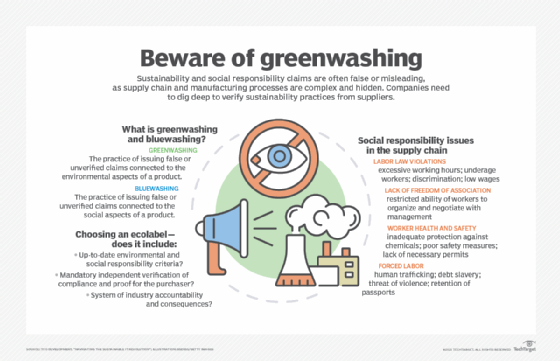
Getty Images
9 biggest examples of greenwashing
Sustainable marketing can improve brand loyalty, but greenwashing diminishes it. Explore nine real-world examples of greenwashing.
Whether intentional or unintentional, greenwashing can tarnish an organization's reputation.
Sustainable marketing campaigns have become prevalent as organizations face pressure from consumers to address environmental, social and governance (ESG) issues. These campaigns can link a brand's public image to environmental sustainability and help drive sales. However, organizations may face accusations of greenwashing from activist groups, consumers and regulatory bodies if they make exaggerated claims.
Greenwashing can erode customer trust, damage brands' reputations and lead to multimillion-dollar fines, said Thomas Husson, vice president and principal analyst at Forrester Research. To avoid such accusations, business and marketing leaders should familiarize themselves with notable examples of greenwashing, which involve brands such as FIFA and Keurig.
9 examples of greenwashing
Organizations in any industry can face accusations of greenwashing. Examples include FIFA, Keurig and Volkswagen.
1. FIFA
The international sports organization FIFA faced public backlash after claiming its 2022 World Cup would be carbon-neutral -- which means the organizers would purchase carbon offsets to counteract all carbon dioxide emissions the tournament generated. Leading up to the event, FIFA released a report detailing its sustainability strategy, but climate experts and activist organizations found faults with it.
 Thomas Husson
Thomas Husson
Carbon Market Watch, a climate advocacy organization, released a 2022 report that suggested FIFA dramatically underestimated the tournament's emissions levels. In 2023, the Swiss Fairness Commission reviewed these findings and ruled that FIFA made false claims. This case demonstrates that organizations should not use terms like carbon-neutral lightly.
"There's lots of very vague definitions about what it means to be carbon neutral, net-zero and carbon negative, which can cause confusion," Husson said. In response, stricter regulations, such as the EU's Corporate Sustainability Reporting Directive, demand that advertisers offer conclusive evidence to support claims of sustainability.
2. Edgewell Personal Care
In July 2025, the Australian Competition and Consumer Commission (ACCC) filed Federal Court proceedings against Edgewell Personal Care Australia and its U.S. parent company for making false or misleading claims about its Hawaiian Tropic and Banana Boat sunscreens. The ACCC alleged that the companies marketed over 90 sunscreen products as safe for coral reefs, despite the products containing chemicals that harm marine ecosystems.
Edgewell's spokesperson said the company plans to contest the allegations. This case highlights regulators' efforts worldwide to crack down on greenwashing. It emphasizes the need for transparent, scientifically backed environmental claims.
3. Deutsche Bank's DWS
In 2021, DWS's former sustainability officer, Desiree Fixler, alleged the asset management company overstated the degree to which it used sustainability criteria -- which evaluate an organization's level of sustainability -- in its investment offerings. Soon after, the U.S. Securities and Exchange Commission (SEC) and BaFin, a German financial regulatory body, opened investigations into DWS.
In May 2022, German prosecutors and police raided the DWS office and Deutsche Bank headquarters in Frankfurt based on greenwashing claims. DWS told reporters it cooperated with the investigation and denied allegations that it misled investors. However, in 2023, DWS agreed to pay the SEC $25 million in penalties. In April 2025, the Frankfurt State Prosecutor's Office fined DWS €25 million for breaching German financial investment laws related to misleading ESG claims.
These investigations serve as a warning for organizations in the asset management industry. Although $25 million is a relatively small sum for large firms like DWS, investigations and legal cases make headlines, which can damage brands' reputations.
"The bigger risk is the reputational risk," Husson said.

4. Keurig
In 2016, the beverage brand Keurig began advertising its K-cup coffee pods as recyclable. However, most recycling facilities in the U.S. and Canada wouldn't accept the pods due to their size and material composition, which led to greenwashing allegations.
For instance, consumers in the Northern District of California filed a class action lawsuit in 2018 against Keurig for its misleading claims, which led to a $10 million settlement. The company also agreed to pay the Competition Bureau of Canada $2.3 million in 2022 and the SEC $1.5 million in 2024 for the false claims.
5. Ikea
Ikea launched a sustainability initiative before many of its competitors, including phasing out single-use plastics in 2020 and planning to eliminate plastic from consumer packaging by 2028. However, the furniture retailer faced accusations of greenwashing after a nonprofit organization, Earthsight, launched an investigation into its supply chain. Earthsight released a report in 2021 that suggested Ikea sold wood that suppliers illegally sourced from Russia.
Like many organizations, Ikea relies on the Forest Stewardship Council (FSC) certification to obtain its wood. The FSC is a voluntary forest certification system that aims to help organizations find wood sourced in accordance with strict environmental and social sustainability criteria. However, the illegally sourced wood that Ikea allegedly sold was FSC-certified, according to the report.
Earthsight's report largely blamed the FSC for Ikea's alleged involvement in the scandal. Following the greenwashing accusations, Ikea said it parted ways with the suppliers.
This case highlights the challenges of supply chain sustainability, even for companies that have led the way in terms of ESG.
"Some pretty well-known sustainable brands … have been caught in greenwashing because it's difficult to master the entire value chain," Husson said. "This is why we're starting to see some organizations going into auditing processes … to ensure that their supply chains are clean."
6. Shein
In August 2025, Italy's competition authority, Autorita Garante della Concorrenza e del Mercato (AGCM), fined Infinite Styles Services -- the operator of Shein's European website -- €1 million for misleading environmental claims. The regulator determined the fashion brand's marketing overstated the sustainability of certain products without offering sufficient evidence.
This enforcement highlights how regulators are increasing scrutiny on fashion brands amid growing concerns over greenwashing in the apparel industry. As consumers demand more transparency, authorities are intensifying efforts to hold companies accountable for exaggerated or unsubstantiated sustainability claims.
7. Kohl's and Walmart
In 2022, the Federal Trade Commission (FTC) filed a complaint against two U.S. retailers, Kohl's and Walmart, for false claims. The companies advertised certain products, such as clothing and bedding, as being made from eco-friendly bamboo fibers. Yet, the items were made of rayon -- a semi-synthetic fiber that requires toxic chemicals to produce.
Both retailers agreed to settle the charges for a financial penalty. The FTC ordered Kohl's to pay $2.5 million and Walmart $3 million.
8. H&M
The fast-fashion brand H&M faced accusations of greenwashing after a 2022 investigation from the news publication Quartz claimed the brand misled consumers with its environmental scorecards.
To offer consumers information about its Conscious Choice collection, H&M used a fashion industry metric called the Higg Sustainability Profile. This metric gauges how much carbon a material's manufacturing releases into the atmosphere compared to traditional materials. It also compares water and energy usage. However, more than half of H&M's scorecards overstated their respective products' environmental soundness, according to Quartz.
In one example, a scorecard for a garment that required 20% more water to create than average said the garment required 20% less water. H&M said a technical error caused this discrepancy.
Misleading marketing like H&M's case has worn down customer trust in corporate sustainability initiatives. Organizations that make false claims may swiftly face greenwashing accusations from an increasingly wary customer base.
Most U.S. consumers consider companies to be responsible for protecting the environment, but only about a third of them trust companies when they say they will commit to sustainability, Husson said.
9. Volkswagen
In 2015, the U.S. Environmental Protection Agency (EPA) discovered that German motor vehicle manufacturer Volkswagen had cheated on federal emissions tests, making its vehicles seem less harmful to the environment than they were.
Volkswagen had installed software into many of its diesel vehicles that could detect emissions testing scenarios, the EPA said. The software lowered engines' emissions during federal tests to bypass regulations. However, in normal driving scenarios, the engines emitted up to 40 times more nitrogen oxides than the EPA allowed.
Volkswagen admitted to cheating on the tests, and the company's CEO resigned shortly after the scandal unraveled. The company faced approximately $30 billion in fines and settlements from regulatory bodies worldwide.
How to avoid greenwashing
Some organizations shy away from marketing their sustainability efforts because they fear being accused of greenwashing. In fact, 75% of U.S. B2C marketing executives fear greenwashing, Husson said. However, avoidance puts brands at a disadvantage to competitors who successfully promote their efforts.
To avoid greenwashing, organizations can ensure regular communication between their marketing and sustainability teams, as greenwashing often occurs unintentionally.
"Greenwashing is more … about miscommunication than about being intentional in misleading consumers," Husson said.
Sustainability teams should convey the risks of greenwashing to marketers to reduce the chances of unsubstantiated or exaggerated claims in ads. Additionally, marketers can move away from storytelling and embrace what Husson calls storymaking -- when organizations collaborate with customers to co-create brand narratives. For example, the clothing company Patagonia's Worn Wear initiative encourages customers to repair and resell their garments.
"You've got to make sure you give your consumers solutions so they can act daily, and they're the ones who are going to talk about it, not you," Husson said.
Editor's note: This article was updated to include additional information and examples.
Tim Murphy is site editor for Informa TechTarget's IT Strategy group.







